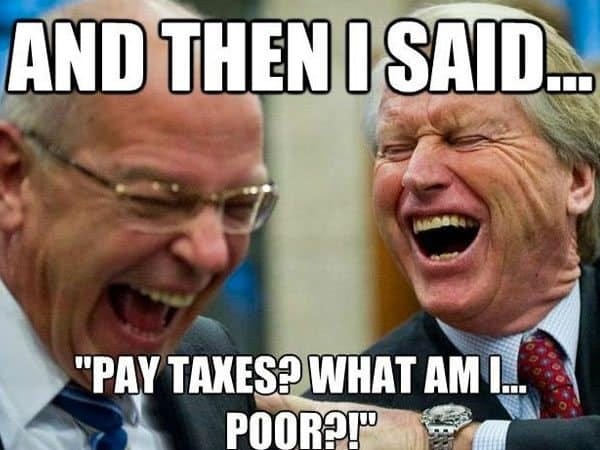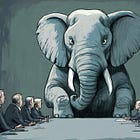TCC #53 — Taxes
"Taxes, taxes, taxes. All the rest is bullshit." — Rutger Bregman
You know what would solve a whole lot of problems right now?
Taxes.
That is, if a certain cohort of people (ahem, the billionaires) would just pay them already.
Trump and Elon (two notoriously non-tax-paying members of the billionaire class) are on a rampage to find $2 trillion (or $1 trillion, or whatever revised figure Elon weasels his way to) to reduce the country’s deficit.
I wonder where they could find it?
It won’t be news to most of you that the richest people in the world pay the lowest taxes — and the same goes for the companies they control. Every year, American billionaires avoid paying more than $150 billion in taxes (for a country that already places an astoundingly low tax burden on the ultra-wealthy), and many Fortune 100 companies pay tax rates in the single digits.
Yet any efforts by brave congresspeople (including historic attempts by Meg’s celebrity crush, Bernie Sanders) have been totally destroyed by the billionaire class, who come up with all sorts of excuses as to why this entirely rational concept would be terrible for society.
No one does a better job at covering this atrocious public deception than Peter S. Goodman in Davos Man. I’ve read an avalanche of great books recently, but Davos Man was a standout. It’s about the hypocrisy of billionaires claiming to care about social justice or presenting themselves as saviours of the people.
(It’s been a timely read, with one of them in the White House and another on the warpath infiltrating government departments.)
Billionaires and mega-companies cannot claim to be altruistic, to care about people or the planet, or to want the best for their country when they do not pay their taxes. Tax avoidance is the #1 form of bad citizenship — and virtually all of them are doing it. (And even those who are paying their way are still being taxed far too low.)
Here’s Rutger Bregman, a Dutch historian and author, speaking to a shocked audience at the annual Davos conference (the highlight of the year for billionaires with a saviour complex) in 2019:
“I hear people talk in the language of participation and justice and equality and transparency, but then, I mean, almost no one raises the real issue,” Bregman said. “Tax avoidance. The rich just not paying their fair share. I mean, it feels like I’m at a firefighter’s conference and no one’s allowed to speak about water.”
Billionaires hate when you bring up taxes — especially the unpaid ones. They claim that taxes are inefficient, and that government programs are wasteful (ahem, Elon), and that the government is simply not as effective as the private sector.
This philosophy gives many billionaires their favourite stance for not paying more in taxes: that they could use the money to help people more efficiently.
During COVID, many billionaires were quick to criticize the government’s response and claim that their own efforts, like turning their factories into PPE producers or securing face masks for hospitals, were keeping people safe and the country afloat. Yet the government’s bungled response was in no small part due to a lack of funding.
“Over recent decades, the billionaire class has ransacked governments by shirking taxes, leaving societies deprived of the resources needed to combat trouble,” says Goodman in Davos Man. “In the midst of a public health emergency, Davos Man was pointing to the resulting weakness of government as justification for depending on his generosity.”
Yet these very government programs would undoubtedly be far more effective if they weren’t crippled by shrunken tax revenue from the billionaire and corporate classes.
What does any of this have to do with corporate sustainability communications?
Actually, a good deal.
Paying your fair share in taxes is the oldest and most basic form of corporate social responsibility that exists. You have to give back to the system that allows your company to operate in a mostly free market and a (so far) free country. As Jim Rohn says, you’ve gotta feed the goose that lays the golden eggs.
So any company that claims to care about people or the planet or purports to be a ‘good corporate citizen’ has to start by paying taxes.
And yet, some of the most vocal social-justice-warrior companies seem to have this upside down.
Take Marc Benioff, Salesforce’s cheesy do-gooder CEO, a key (and hilarious) figure in Goodman’s Davos Man.
In 2018, Benioff and Salesforce donated $7 million to a successful lobbying campaign to require San Francisco companies (like Salesforce) to pay a new tax to end homelessness. The new taxes would cost the company approximately $10 million a year, which sounds like a lot until you learn that in that same year, Salesforce earned more than $13 billion and paid exactly zero dollars in federal taxes.
Legal tax evasion doesn’t seem to make for bad PR in the way that visible lobbying campaigns and philanthropic donations make for good PR. Yet taxes may be some of the best form of altruism we have.
In Goodman’s words:
“Benioff and his wife, Lynne, appear genuinely concerned about the state of American education and children’s health. They have demonstrated their concern with their checkbook. But what happens to programs like Medicaid and Head Start—key sources of health care and early childhood education for low-income Americans—when the largest companies pay no federal taxes? What happens to mass transit, to job training, to roads and highways, to public-health research?”
State and federal taxes fund a lot of activities. And who knows, maybe there will be no government agencies left to fund by the time this piece goes live, but in principle, there is no free and equal society without taxes. At this point, there’s also no healthy planet without them either.
Taxes do a lot for climate change. They can save lives by funding climate resilience initiatives. They can change hearts and minds by sponsoring edcuational campaigns. They can support research into necessary climate solutions, help conserve critical biodiversity hotspots, and fund disaster recovery for the victims of an already changing climate.
Whether companies pay their fair share in taxes has a lot to do with the credibility of their sustainability communications. But it’s also one of those things — like legal disclaimers, or lobbying efforts — that sustainability teams and communicators can’t do much about.
If you’re the writer for Salesforce’s sustainability report, or the carbon expert helping Meta map their supply chain emissions, or the renewable energy procurement team at Amazon, you can’t do anything about whether Benioff or Zuckerberg or Bezos are paying their fair share of taxes.
Even if you can’t do anything about it, I still believe it’s worth knowing about. Maybe it gives you better context when leadership asks you to frame sustainability initiatives as ‘helping customers live more sustainably’ or ‘encouraging employees to give back.’ Maybe it helps you choose which jobs to apply for and which companies to take seriously. Maybe it just takes some of the pressure off you, as an individual, being bombarded by messages to ‘choose consciously’ and ‘give what you can.’ You don’t have to drink the Kool-Aid these guys are selling.
Ultimately, taxes may just be the #1 elephant in the room for corporate sustainability discussions. Until companies are honest about what they owe society, they cannot claim to be ‘giving back’ — only withholding.
I’ll let Bregman, as featured in Goodman’s book, see us out:
“This is not rocket science,” [Bregman] said. “We can talk for a very long time about all these stupid philanthropy schemes, we can invite Bono once more, but, come on, we’ve got to be talking about taxes, and that’s it. Taxes, taxes, taxes. All the rest is bullshit.”






100% agree and wish this was more featured in climate communications. Any government 'solution' that involves more austerity on its citizens is wilfully perpetuating injustice. We in the Global North have enough wealth to lift millions out of extreme poverty, pay all our climate loss & damage pledges, and still have millionaires at the end.